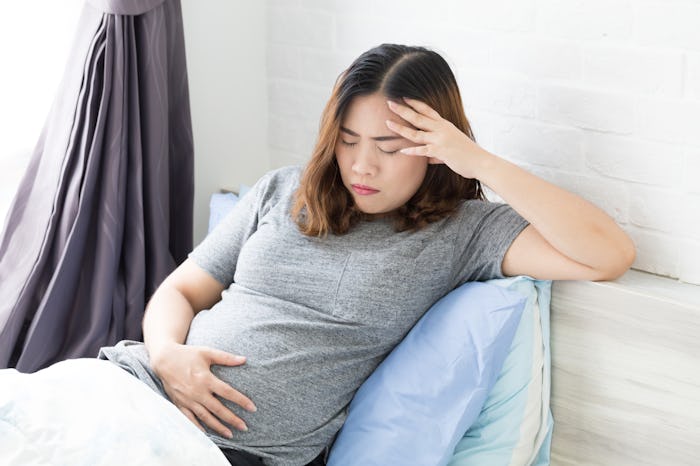Life

7 Things A Pregnant Woman Should Absolutely Never Do To Cure A Headache
I have even been known to say that I would choose the pain of birth as opposed to the whole body throbbing associated with my chronic migraines, because at least with birth there is an end in sight. When it comes to head pain, you never know how long it will last — my worst migraine was six straight days of hell. When you're in the midst of that pain, you would try almost anything to find relief, but knowing how to cure pregnancy headaches means knowing what you shouldn't do to cure one. You'll want to be careful if you are carrying a little one.
According to the American Pregnancy Association (APA), if you experienced headaches or migraines before pregnancy, then your changing hormones could cause their occurrence to go either way. The APA noted, "migraine headaches are like the lottery when it comes to pregnancy," but that sounds like a potentially very unlucky lottery if you ask me. The good news? Some people really do notice a decrease in chronic head pain when they are pregnant, yours truly included. I didn't have a single migraine when I was pregnant with my daughter.
But if you do experience head pain while you are pregnant, then you might need to avoid a few of your tried-and-true measures for finding relief. Below, I help you suss out the details.
1Take Aspirin Or Ibuprofen
According to the APA, you'll want to avoid popping pain relief medications such as aspirin, naproxen, and ibuprofen, opting for something like acetaminophen instead. But make sure you tell your healthcare provider first in order to confirm the best over-the-counter option. Dr. Sherry Ross, an OB-GYN and women’s health expert at Providence Saint John’s Health Center in Santa Monica, California, tells Romper that narcotic pain medications should also be avoided during pregnancy "since they have an addictive effect on both mom and baby."
2Reach For Your Migraine Medication
If you are one of the more than 37 million people suffering from migraines in the United States, then you'll want to think twice before using a class of drugs called triptans (e.g. Imitrex, Amerge, Relpax) to treat your head pain, according to Parents. Other popular medications to avoid include Depakote and beta-blockers, noted Baby Center. "Anti-migraine medications have been linked to birth defects, bleeding, miscarriage, poor growth of the developing baby, and should be avoided," says Ross, who is also the author of she-ology: The Definitive Guide To Women's Intimate Health. Period.
3Certain Headache-Relieving Yoga Poses
There are several yoga poses that are said to help relieve head pain, but not all of them are safe for pregnancy. You'll want to avoid inversions, lying flat on your back, or twisting poses, according to CureJoy. That means downward facing dog and matsyendrasana (twist) — which are both said to alleviate head pain — might be out of the question, especially if you weren't practicing yoga prior to becoming pregnant.
4Treat Yourself To A Massage
This one isn't completely off limits, it just comes with some precautions. Massage during pregnancy can be a wonderful tool to help alleviate back and joint pain, improve circulation, and reduce stress, according to the APA. And during some of my worst migraines, massage has been an integral part of helping me to find some relief. The APA noted that women can begin massage therapy at any point in their pregnancy, but many facilities do not offer services to a woman who is still in her first trimester "because of the increased risk for miscarriage associated with the first 12 weeks of pregnancy." Modified positions, like lying on your side, can help to accommodate your growing belly and ensure your baby continues to grow healthfully.
5Wait It Out For Too Long
If your headache gets worse or is accompanied by other symptoms, like blurred vision, a fever, or slurred speech, then it's time to call your healthcare provider, according to Baby Center. Sudden, sharp headaches, or first-time head pain that occurs in your second or third trimester could be a sign of preeclampsia or another health issue, the website noted.
6Ignore It In Lieu Of Keeping Things Natural
Don't assume that just because you are trying to avoid certain medications or treatments while you are pregnant that there isn't something you can do to help with head pain. Acupuncture is a useful natural tool for treating headaches during pregnancy, as well as back pain and morning sickness, according to What To Expect. Just be sure to look for an acupuncturist who is licensed by their state and certified by the National Certification Commission for Acupuncture and Oriental Medicine (NCCAOM) to ensure they are knowledgeable enough to treat you safely, the website noted.
7Don't Try To Cure The Wrong Thing
Don't forget to consider that the pressure or pain in your forehead and around your eyes could be a sinus infection — not a headache. Most infections can be treated at home with a humidifier, saline nose drops, rest, and plenty of fluids, but it's important to consult your doctor if you run a fever or think medication might be necessary to nix it once and for all, the APA noted.
Check out Romper's new video series, Bearing The Motherload, where disagreeing parents from different sides of an issue sit down with a mediator and talk about how to support (and not judge) each other’s parenting perspectives. New episodes air Mondays on Facebook.
This article was originally published on